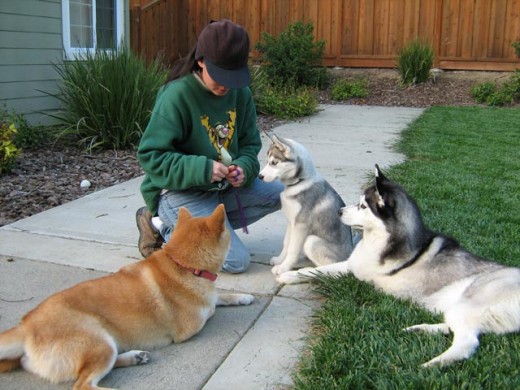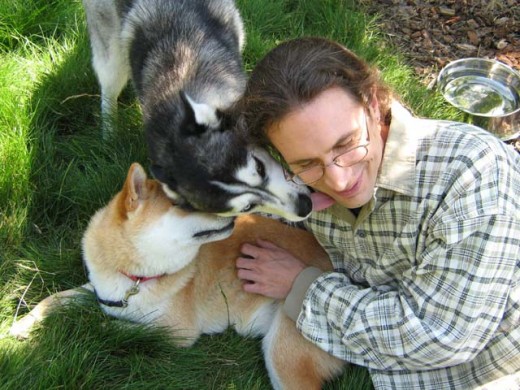Dogs are dogs, and they are not human.
This is a true statement.
According to Wikipedia,
Currently, the domestic dog is listed as a subspecies of Canis lupus, C. l. familiaris.
We humans are not part of that evolutionary tree, so it is true that dogs are not human. However, there is a tendency on our parts to humanize our dogs anyway. We often overlay human feelings and human morality onto our dogs’ actions.
Bad Max pooped on my carpet because he was trying to get back at me for leaving him alone.
Sam dug up my roses and chewed up my designer shoes because he does not love me anymore.

Humanizing our dogs can end up hurting our dogs, and ourselves, because we end up not seeing the root cause of their behaviors.
Max probably pooped on the carpet because of anxiety.
Sam likely dug up the roses and chewed on shoes because he was bored and nobody else provided alternate activities for him.
However, “dogs are not human” is not some magical line that can be used to dismiss our responsibilities to our dogs.
1. Grooming and Basic Care

The other day, I read an article where the author proudly proclaimed that “dogs are not human” and therefore there is no need to brush their teeth or take them to the vet for ‘little things’.
One has nothing to do with the other.
Dogs need a certain amount of basic care.
Dog grooming, including nail clipping and teeth brushing will help to improve the general health of the dog, give him a higher quality of life, as well as hopefully a longer life. There are also teeth cleaning toys available in lieu of teeth brushing.
As for vet visits, there are some things that can be treated at home, but there are other things that require medical attention. There are a variety of books written by qualified veterinarians describing symptoms that are treatable from home and those that require veterinary attention.
Anything that involves bloody discharge usually means that a vet visit is necessary, sooner rather than later.
Yearly vet visits are also necessary for shots against dog diseases (e.g. Parvo, Rabies) and sometimes for teeth cleaning.
But dogs are not human. In the wild they would not have a vet.
True, and dogs have shorter lifespans in the wild.
They also do not have to deal with overcrowding, synthetic materials, cars, or live in the backyard all day with nothing to do. If dogs should be wild, then leave them in the wild and get a fish for a pet.
Or perhaps a robot dog.
2. Affection

Another popular area where this “dogs are not human” line often gets trotted out is in giving affection or even food rewards to our dogs. Apparently, because dogs are not human, it is somehow wrong to give them human affection.
In truth, much of this affection-giving is more for us, than for our dogs. Giving affection to our dogs makes us feel better, and helps to lower stress.
There is nothing wrong with giving affection, attention, or food rewards to dogs, as long as it is done with the right timing to reinforce good behaviors.
Some of us run into problems because we reward or give affection at the wrong time, and as a result the wrong behavior gets reinforced.
Timing is one of the most important components in dog training and in shaping a dog’s behavior. If you discipline or punish your dog at the wrong time, you will also inadvertently encourage bad behaviors.
In fact, this University of Pennsylvania study shows that aversive methods have a higher probability of encouraging aggression in dogs compared to reward techniques.

3. Physical Aversive Training
“Dogs are not human” is also often used as a reason for why physical aversive training is more effective than other types of training.
In particular, since dogs are not human, we should try to be like dogs and hit them, bite them, slap them, pin them to the ground, and growl at them.
Just as dogs are not humans, humans are not dogs.
However hard we may try, we will never be dogs, and our dogs will always be aware of this plain fact.
Both reward and aversive techniques come from the field of behavioral psychology, and behavioral psychology techniques can and has been applied to both humans and dogs.
For example, if you look-up desensitization and flooding, you will see that they have been applied, and are still applied to help both dogs and humans cope with phobias and stress.
It may be true that “dogs are not humans”, but that statement has nothing to do with the behavioral psychology techniques that we apply to train dogs and shape behavior.
Dogs are not human, but that does not mean they respond better to aversive stimuli.
One does not follow from the other – they are two separate statements that have no relation to one another.
Yes, dogs are not human.
All that means is we should try and understand their behavior, without any human moral overlay.
We should learn to communicate with them, so that they understand us, and we understand them. By doing this, both dog and human can share a strong, happy, and lasting bond.

Dear ShibaShake,
I enjoyed your pics demonstrating your journey with your animals. But. Just kidding. Its super awesome and I love your references to balance and calm people. Reading here has given me new ideas and states of mind to approach and take with my doggies.:-) Thanks and keep on keepin on , your vibe is write . Oops or and ” right “.
All this is 100% true but I think you’re missing the point. People who morally overlay their dog’s behaviour are in need of connection with the animal, real or imagined. Advising them it’s wrong won’t stop the need. I see it all the time with my dog-loving friends. One even told me he loves dogs because they care for their puppies more than human women care for their babies. There is no stopping this kind of delusionary thinking, I’m afraid. He wants/needs to believe that dogs are superior to humans for whatever reason and an article on the internet isn’t going to stop him
Dear Lily,
Sounds like there is more going on here than just humanizing a dog. Nevertheless, I write to share my own experiences and to have discussions with other people about dogs. Through sharing, we think new thoughts, and we change.